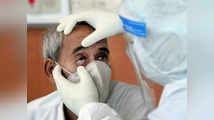
The pandemic took a serious turn when the second wave of COVID-19 plagued India’s population. It claimed many lives and affected not just the adults but also the younger generation. While the possibility of a third wave continues to frighten the masses, the scientific discussion around whether a person, who has been infected with the virus, develops lasting immunity or is still prone to reinfection is going on for a long period of time now.
readmore
02/7What is COVID reinfection?
Reinfection is when a person is infected with a disease, recovers over time, but develops the same illness again. Given the scientific evidence from the past, viruses can cause reinfection for various reasons. However, when it comes to COVID reinfection, scientists are yet to reach a solid conclusion. According to an Indian Council of Medical Research (ICMR) study, reinfection is when an individual tests positive for the virus on two separate occasions in an interval of 102 days with a negative test result in between.
Read more: Coronavirus: What is the possibility of reinfection in COVID-19 patients? Here’s what ICMR study has found
readmore
03/7Is reinfection possible in COVID-19 patients?
In an earlier research conducted by the Indian Council of Medical Research (ICMR), out of the 1300 cases, 58 or 4.5% cases were termed as possible reinfections. That said, of the 58 cases, the two positive results had come at least 102 days apart, with instances of negative test results in between. However, the study encourages further investigation for the same. Currently, there have been no conclusive reports about whether a person who has been infected once develops permanent immunity against the disease, or can get reinfected post recovery.
readmore
04/7How long does COVID immunity last?
Different studies have suggested that people who recover from COVID-19 develop immunity against the SARs-COV-2 virus for a certain period of time.
Case studies from the National Institute of Health have established that immune cells and proteins learn to recognize and kill the pathogen if it’s encountered again, protecting against disease and reducing illness severity. However, the extent to which immunity may last is subject to many factors.
A study led by the researchers at Washington University School of Medicine at St. Louis, published in the journal Nature, also found that months after recovering from mild cases of COVID-19 infection, people still have immune cells in their body pumping out antibodies against the SARS-CoV-2 virus. During the study, antibody cells were found in people even after 11 months of infection, which is a long time.
Read more: ANSWERED: How long do antibodies last in the body after COVID-19 infection?
readmore
05/7A recent study suggests lasting immunity for upto 10 months in COVID-recovered patients
According to a study conducted by a team of researchers at the University College London (UCL) prior COVID infection can reduce the risk of developing the disease for upto 10 months after infection.
The study, published in The Lancet Healthy Longevity, looked into the reports of 682 care home residents, with a median age of 86, and 1,429 staff in care homes. It was found that a third of the participants showed signs of having COVID antibodies. Approximately 85 percent of the care home residents, who had previously been infected with the virus, had a lesser chance of contracting the virus again. In the case of the staff, it was 60 percent.
Maria Krutikov of the UCL Institute of Health Informatics, the lead researcher of the study, said, “It’s really good news that natural infection protects against reinfection in this time period. The risk of being infected twice appears to be very low.”
“The fact that prior COVID-19 infection gives a high level of protection to care home residents is also reassuring, given past concerns that these individuals might have less robust immune responses associated with increasing age,” she added.
The study did not consider the impact of vaccination and removed people 12 days post their first jab. A separate study will be conducted to investigate the efficacy of the vaccines.
readmore
06/7How to identify reinfection cases?
Cases of reinfection can only be confirmed with the help of genome analysis of the virus sample. Given that the virus continues to mutate, scientists believe that the genome sequences of the two samples would show some differences.
Read more: Coronavirus vaccine: How long does COVID-19 vaccine immunity last? Here’s what research has found
readmore
07/7Bottomline
While the scientific discussion around COVID reinfection continues to remain open, it is important to avoid any assumptions. That said, even if you have been infected with COVID-19, it does not guarantee that you’re protected against the virus. You can still contract it and be a carrier. Therefore, given the unpredictability of the COVID virus, continue taking all precautionary measures.
readmore
read the full story about COVID immunity can last up to 10 months: Study
#theheadlines #breakingnews #headlinenews #newstoday #latestnews #aajtak #ndtv #timesofindia #indiannews












